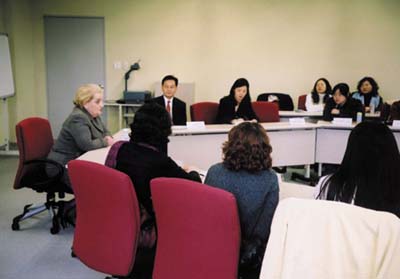
The mother of three daughters, Madeleine Albright"s enthusiasm for politics began at an early age, as she took on her father"s interest in politics. She developed this interest further during her education at Kent School, where she founded an international relations club, and at Wellesley College, where she participated in the 1956 Stevenson campaign as a fervent Democratic supporter. She also had the satisfaction of supporting a winning candidate, John F. Kennedy, when he ran for re-election to the Senate. However, up until this point she had only worked as a volunteer. She held her first formal job when she was 34 as the Chief Legislative Assistant to Ed Muskie.
Dr. Albright has much in common with Ewhaians, in being female, in being ambitious, and in being educated in an environment where women leadership is greatly encouraged and sought for. Albright is known for her "brooch diplomacy," the habit of wearing a brooch to match the situation or mood she is in. This habit became a trademark when Sadam Hussein called her a "snake," and she showed up shortly thereafter with a snake brooch on her suit. On the day of her visit to Ewha, Dr. Albright wore a brooch in the form of a dragonfly, perhaps symbolic of autumn.
She was not the hard fisted and aggressive talker people had expected. Instead, she was humorous, helping to break the ice in the room by shifting between colloquial and formal rhetorics appropriately. When she answered questions posed by students, Albright was straightforward and helpful.
Dr. Albright answered questions on U.S. policy on North Korea, anti-Americanism, and the advantages she felt she gained by attending a women"s college and being a woman, among other topics.
North Korea"s low stand in the international arena is largely due to its non-compliance with international security agreements. However, Dr. Albright also points out to North Korea"s poor sense of when to negotiate. It lost an opportunity when U.S. policy shifted from the "North Korea friendly" and non-confrontational Clinton administration to Bush administration, whose party had the motto of "ABC" (Anything But Clinton). To make matters more complicated, Kim Dae-jung"s administration is leaving office in a couple of months, which may leave its sunshine policy in limbo.
As when discussing rising anti-American sentiments around the world, Dr. Albright responded in her usual, clear, and straightforward manner, ?"Unlike the Cold War when nations could choose to be on either side, the U.S.S.R. or the U.S., today there is no such balance of power. The U.S. stands alone as the single super power. It is far ahead of others in terms of its military, economy, and size. Anti-Americanism is a natural feeling people get because Americans have so much when others don"t." She added that, in her opinion, it is not the U.S. itself that people do not like, but the contribution it has made to the gap between the rich and the poor.
Dr. Albright said she found the categorization of her as a female, a "lady," to be an advantage to her in her public life. "You can be charming and at the same time be tough. You have an advantage because people don"t expect you to be tough."
She urged Ewha students to take complete advantage of the opportunities given to them at a women"s university, saying, "Women get to have all the leadership roles and you get to interact with outstanding women professors, who would have had a hard time getting a position in other schools despite their abilities. Thus, a women"s university provides role models students can directly relate to."
She also urged women to speak up. "If you don"t speak, then your views will not be heard." She did not give a formula for how to live, saying one formula does not exist.
Nevertheless, she described life as she saw it: "Life comes in segments. You live as if you were building a resume. For example, I was involved in politics and I also volunteered in various areas. Each segment led to one another. The key is to try to do all things all at once."
neyessioui@ewha.ac.kr
Ewha Voice
evoice@ewha.ac.kr

